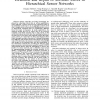710 search results - page 68 / 142 » Composite Event Detection in Wireless Sensor Networks |
71
Voted
GLOBECOM
2007
IEEE
15 years 5 months ago
2007
IEEE
— Energy-ef ciency is one of the major concerns in wireless sensor networks since it impacts the network lifetime. In this paper, we investigate the relationship between sensor n...
100
click to vote
WICON
2010
14 years 9 months ago
2010
Clock skew is defined as the rate of deviation of a device clock from the true time. The frequency of a device's clock actually depends on its environment, such as the tempera...
ICCCN
2007
IEEE
15 years 5 months ago
2007
IEEE
Abstract— With the rapid deployment of wireless sensor networks, there are several new sensing applications with specific requirements. Specifically, target tracking applicatio...
143
click to vote
SUTC
2006
IEEE
15 years 5 months ago
2006
IEEE
Abstract— Sensor networks are being increasingly deployed for collecting critical data in various applications. Once deployed, a sensor network may experience faults at the indiv...
IJSNET
2006
14 years 11 months ago
2006
: In this paper, we present a two-tiered scheduling approach for effective energy conservation in wireless sensor networks. The effectiveness of this mechanism relies on dynamicall...

